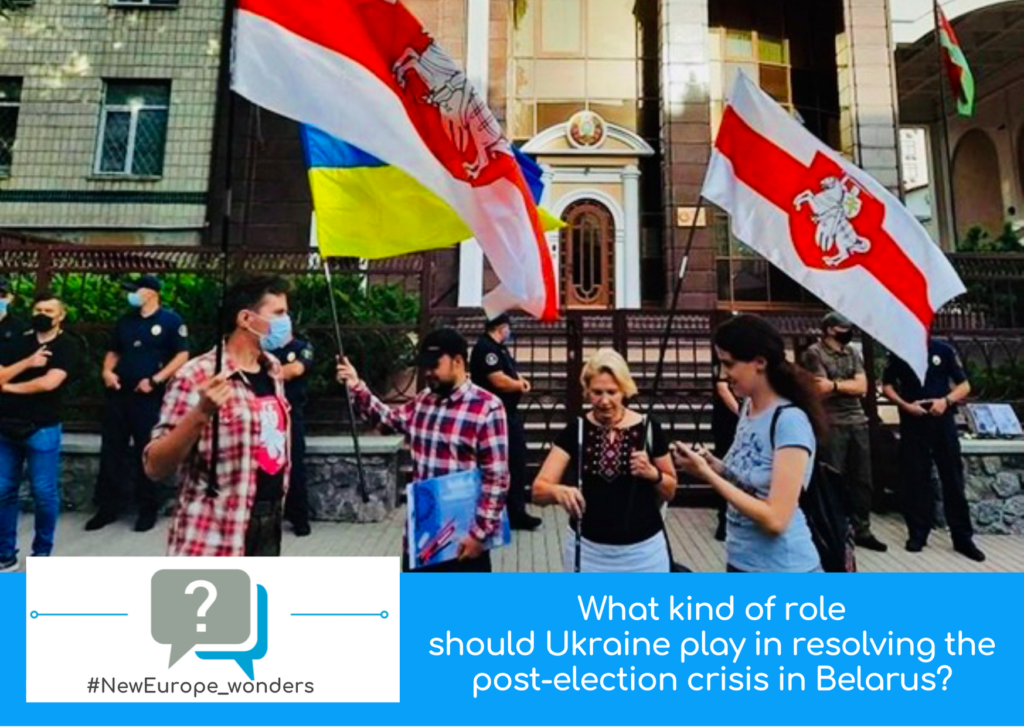The paper is written within the rubric “New Europe Wonders” .
The PDF-version is available here.
The paper was also published on the web-site of the newspaper “Segodnya” (in Ukrainian and Russian).
Discussions in Ukraine about how Kyiv had to react to the events in neighboring Belarus and what would be the right choice for further reactions continue. Some believe that Ukraine should act more actively and persistently. Others point out to the limited influence of Kyiv. What kind of role should Ukraine play in resolving the crisis in Belarus? What should Ukraine do? In terms of the traditional rubric “New Europe Wonders…” our Center received answers to these questions from leading experts from Belarus, the EU and the US. A key motif of expert recommendations: Ukraine should provide moral support to the opposition, help political refugees, as well as actively communicate the Belarusian case on international platforms.
Zmicier Mickiewicz, Journalist, Belsat TV channel; Analyst, Belarus Security Blog, Belarus
It seems to me, that Ukraine should, together with neighbouring countries of Belarus, impose maximum pressure on Alexander Lukashenka, who is illegally holding power in the country with the help of mass terror of the population. We need to call these things by their proper names and impose the greatest possible ECONOMIC sanctions against the regime – both general and personal. It is also worth considering the procedure for granting Ukrainian citizenship to those Belarusians who have been in Ukraine for a long time and even fought for its territorial integrity. At the same time, help for politically repressed Belarusians would also be useful in any form – from providing them an opportunity to study in universities to direct financial support of the regime victims of terror.
Katsiaryna Shmatsina, Political Analyst, Belarusian Institute for Strategic Studies (BISS), Belarus
First, even the symbolic support matters, such as bringing Belarusian historical flags to Rada. This gesture sends a clear message of solidarity to a broader audience of Belarusians, beyond the policy professionals circle.
Secondly, while the bilateral ties between Kyiv and Minsk are on hold, Ukraine can promote the Belarusian agenda internationally. This entails supporting the calls for a dialogue and facilitation under the auspices of the OSCE, also highlighting the issue through the Eastern Partnership mechanisms. One of the possible steps could be to call the EU to impose a strict control mechanism of the usage of the EUR 53 million support announced by President von der Leyen to Belarus. Currently only EUR 3 million from that package are allocated for the support of civil society and victims of repressions, while 50 million are assigned for the covid-recovery assistance. EU should ensure that these money won’t be absorbed by the government agencies and essentially to sustain the system.
Generally, it is important to underline that president Lukashenka is no longer a legitimate leader for Belarus. While explicit calls for a dialogue between Sviatlana Tsikhanouskaya, Coordination Council and Aliaksandr Lukashenka might be perceived with controversy as to the interference in the domestic affairs, one thing that any democratic actor can do for Belarus internationally is to keep bringing Belarus to the spotlight. Protest moods in Belarus remain strong, yet at some point international coverage of the Belarusian developments might decrease. Keeping in mind that an unfolding fight for a democratic change in Belarus is a marathon, not a sprint, Ukraine could keep Belarus in focus of the international community.
Paul D’Anieri, Professor, an Expert on Eastern European and post-Soviet politics, University of California in Riverside, USA
We should recognize the limits of Ukraine’s influence over the situation in Belarus. Ukraine’s most significant impact is as a role model for or inspiration for the potential for street protests to overturn a rigged election. In that respect, it has already done a great deal. The Ukrainian government’s influence over the Lukashenka regime is minimal, especially compared to that of the EU and Russia. Therefore, there is not much to be gained by siding against Lukashenka, and there will be something to lose if he remains in power. There is real danger for Ukraine in the situation. It seems likely that Lukashenka will manage to hang onto power, but be much more beholden to Russia as a result, leading to increased pressure on him to consummate the dormant union state. Even if Lukashenka is ousted, we should not anticipate a democratic, pro-EU, or pro-Ukraine government coming to power anytime soon. Ukraine might benefit most by aligning itself closely with the EU, which would put it on the right side while demonstrating that it can be a good team player.
James Nixey, Director, Russia-Eurasia and Europe Programmes, Chatham House, UK
Ukraine has a vital role to play and, frankly, a heavy responsibility. Ukraine has had its revolutions and has come out the other side. It is not a paragon of virtue, but its considerable achievements since the Euromaidan would not have been possible without that revolution.
This is sadly true now for Belarus. Without revolution it cannot progress. The principal lessons the country as a whole needs to learn are how did Ukraine ‘win’, and how did they achieve the qualified success they have managed subsequently (the hard bit is not even toppling the government – it’s running a more effective and just country afterwards).
From the Ukrainian government side rhetorical support is needed for the true victors of August’s election – the opposition and the protestors. There is no longer any point or any justice in maintaining meaningful contact with the Lukashenka regime. But Ukraine’s civil society has always been its saving grace and prominent civil society individuals there can surely make contacts with the key people in the Belarusian opposition movement and offer them the benefit of their successful experiences.
Dr. Florent Parmentier, Secretary General, the Center of political researches of Sciences Po (CEVIPOF), France
“The post-electoral crisis in Belarus is crucial for Ukraine as well as for the EU and Russia. For many member-states, it has been seen as a new “solidarnosc moment” or a new “Baltic Way moment”, while others may be impressed by the peaceful character of the protest after several weeks of mobilization. European actors must deter Belarussian leadership to crackdown this social movement and support and engage the claim for new elections. In this perspective, Ukraine’s interest is to avoid destabilization, finding a balance between the necessary deterrence against harsh repression directed at the opposition and to engage protagonists from both sides. Should the incumbent power be ready to negotiate – under a mix of external pressure, defection in the repressive state apparatus or financial constraints – Ukraine might be seen as an honest broker, which would raise its profile internationally. The protestors have been willing so far to avoid any “geopoliticization” of the movement, fearing that it would give arguments for the pro-Lukashenka camp to stay in power.
Then, another question is whether the opposition is ready to govern in a difficult period. Ukraine and the EaP countries may have relevant experience to share in that field.”
Dr. Katrin Böttger, Director, the Institute for European Politics (IEP), Germany
Ukraine could play a unique role in helping resolve the post-election crisis both due to its geographical proximity and its own experience with political transformation. In line with other third countries, it should not interfere on a political level but take a clear political position on Belarus. This should include support condemning violence, repeating the election and applying the sanctions imposed by the EU. On a civil society level, Ukrainian organisations already are and should continue to give support to cooperation partners regarding lessons learnt from fake new during and trauma therapy support after the Euromaidan. In addition, it could share its experience in enabling a sustainable and inclusive exchange between civil society organisations in Belarus.
In case of further escalation both Ukraine and the international community need to be ready to give up Minsk as a platform for meetings of the Trilateral Contact Group on Donbas. Civil society especially along the border would be in high demand to support displaced persons with humanitarian and medical aid. In any case, Ukraine should acknowledge and be prepared for playing a central role in distributing targeted and practical support.
Paul R. Pillar, Nonresident Senior Fellow, Center for Security Studies, Georgetown University, US
Ukraine can be most useful in resolving the political crisis in Belarus not so much through direct involvement in that crisis but rather by setting a reassuring example of peaceful political development in a former Soviet state situated between Russia and the rest of Europe. This is not to say that there is any one political formula that would apply equally to Ukraine and Belarus, especially because Belarus will inevitably be closer to Russia politically and culturally than Ukraine is likely to be. But if Ukraine can resolve its differences with Moscow in a way that that includes both stable relations with Russia as well as beneficial relations with the West, then the relevant parties in the Belarus situation—including the Russian government—may feel more comfortable making necessary concessions.
Of course, to the extent that any opportunities arise for Ukraine to use its good offices as a mediator in Belarus, it should not reject that opportunity. It probably is fortunate that Sviatlana Tsikhanouskaya fled to Lithuania rather than to Ukraine, which would have complicated whatever constructive role Kyiv can play.
Daniel Szeligowski, Head of Eastern Europe Programme, Polish Institute of International Affairs (PISM), Poland
Ukraine should play in one team with its international partners in order to step up pressure on Alexander Lukashenka so that he starts a dialogue with the opposition. To this end, the Ukrainian authorities should not be afraid to follow the EU and apply personal sanctions against the representatives of the Belarusian regime responsible for the crackdown on the society. Ukraine is not in a unique situation as some Ukrainian experts would like to claim (quoting the scenario of possible Russian intervention from the Belarusian territory, the on-going negotiations within the Trilateral Contact Group in Minsk, etc.) for the purpose of building the rationale for “walking between the raindrops” approach. Actually, the fact that Lukashenka has deliberately accused Ukraine – together with Poland, Lithuania and Latvia – of instigating post-election protests in Belarus only proves why Kyiv should coordinate its stance vis-à-vis Belarus with other countries in the region. In the short term, Ukraine would especially be in a position to give a helping hand to the repressed Belarusians, the more so that president Volodymyr Zelensky himself, at the beginning of his presidency, declared that in his country representatives of all nations who suffer from authoritarian and corrupt regimes would find a roof over their heads.
Richard Weitz, Senior fellow and Director, the Center for Political-Military Analysis at Hudson Institute, USA
The fate of Belarus has great implications for Ukraine given the two countries’ proximity and similar status as former Soviet republics that do not enjoy the protections of NATO membership.
Despite this intertwined state, Ukraine’s ability to influence the outcome in Belarus is, like that of other Western countries, limited due to the strength and ruthlessness of Belarus’ internal security organs and Moscow’s support for the repression.
Given this context, Ukrainians can best support the post-crisis transition of Belarus into a more democratic and independent state by providing refuge to persecuted opposition leaders, criticizing the Belarus regime’s violations of people’s human and civil rights, drawing attention to the Belarus situation in major international forum and media like the UN, pressing Germany to suspend or cancel the Nordstream II pipeline over the Navalny assassination to make clear to Moscow that aggression against the Belarusian people could incur additional costs, and strengthening its own democratic practices, civil society reforms, military defenses, and other safeguards against authoritarian threats.
Ryhor Nizhnikau, Senior Research Fellow, the EU’s Eastern neighbourhood and Russia, Finnish institute of international affairs, Finland
Ukraine’s role can be two-fold. First, the West lacks a deliberate policy towards Belarus. Currently, Ukraine follows the EU’s general line. At the very least, it shall try to explain the West that its lack of action and vision will have dire consequences. Ideally, Ukraine can show some leadership, lobby and contribute to a creation of a coherent and adequate policy towards Belarus (perhaps in collaboration with Lublin Triangle partners). It is time to realize that besides the discredited policies of weak sanctions and re-engagement on regime’s terms, which the EU jumped between during the past decades, there are potentially more viable and efficient options, which would better suit interests and values of the EU and Ukraine, but first and foremost one that would serve interests of Belarusian people.
Second, if any Western strategy emerges in mid-term, hypothetically Ukraine might serve as a trusted communication channel between the regime and the West. Russia is the most serious risk for Lukashenka and Belarusian elite and they realize that well. Ukraine can present and advocate alternatives to Moscow’s plans, if they appear. If not, at least, they can keep highlighting the dangers of Moscow-engineered (transition) plans for elite’s preservation of its political power and economic assets.
Yet, at this very moment, Ukraine should focus on supporting Belarusian people and civil society. Besides solidarity, information and humanitarian assistance, Ukraine can share its knowledge and experience on how to develop sustainable grassroots initiatives.
Cristina Gherasimov, Research Fellow, German Council on Foreign relations (DGAP), Germany
The crisis in Belarus predicts to be a long one with yet an unclear ending and only more political instability on the way. At the same time, Ukraine shares a long enough border with Belarus for the increased political instability in its northern neighborhood to likely result in destabilization for Ukraine itself. Therefore, Ukraine has no choice but to react to the unfolding developments. But while Ukraine is steadily pulled into the Belarusian/Russian propaganda of foreign interference in the affairs of Belarus, it should avoid infusing geopolitics into its response at all costs.
One way is to focus on actively supporting the Belarusian society while domestic politics cool off in Minsk. Supporting protesters and members of the opposition with necessary legal aid services or keeping an open door policy for the IT sector’s possible evacuation from Belarus are only few of the actions that Ukraine could undertake while not giving Lukashenka’s regime more motives to call out on Ukraine. In the meanwhile, Kyiv should work on developing a new strategy for its further relations with Minsk. While Lukashenka continues to speak of Ukraine as “the enemy,” and Russia may encroach on its northern borders via a more integrated Union State of Russia and Belarus, Ukraine needs to be a step ahead and rethink its security strategy deriving from possible new threats. Ukraine should also use the situation to strengthen its own case against an increasingly assertive Russia by collecting evidence of hybrid warfare that it uses in Belarus and call out on its actions where the EU and its member states cannot speak with one voice.
The paper was written within the Think Tank Development Initiative for Ukraine (TTDI), carried out by the International Renaissance Foundation in partnership with the Think Tank Fund of the Open Society Initiative for Europe (OSIFE) with financial support of the Embassy of Sweden in Ukraine. The views and opinions expressed in this paper are those of the author and do not necessarily reflect the position of the Embassy of Sweden in Ukraine, the International Renaissance Foundation, and the Open Society Initiative for Europe (OSIFE)



















